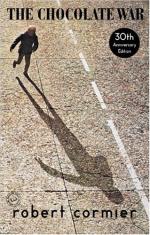|
This section contains 459 words (approx. 2 pages at 300 words per page) |

|
There is a striking similarity between the end of Robert Cormier's The Chocolate War and the end of William Shakespeare's Hamlet. In both works the hero gives a final message to his closest friend, one whose suffering has been chiefly that of a spectator. (p. 217)
Like Shakespeare's play, The Chocolate War is concerned with putting things right in a world gone rotten. Jerry's story of standing out for conscience is carefully, convincingly built, and if its obsessive concern with the evil of Brother Leon and Archie needed justification—which it does not—Shakespeare again provides a model. He, too, was fascinated by the creative springs which can be tapped, in some men and women and children, only by the impulse to control and destroy. Even in Othello, where the destructive will works itself out in a particularly perverse way, Shakespeare finally asserts the grandeur of life; and in...
|
This section contains 459 words (approx. 2 pages at 300 words per page) |

|


